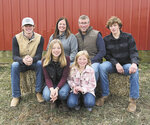


CUBA CITY, Wis. — For decades, Brett Runde and his father, Greg, watched many of their neighboring farms convert from conventional to organic farming. The Rundes were skeptical about the practice, but when conventional milk prices steadily declined and organic farming continued to progress, they decided to take the leap.
Their farm was certified organic in 2018, and the Rundes have not looked back.
“I always liked the thought of pasturing cows, but organic made me nervous,” Brett said. “But honestly, it’s been the best thing we’ve ever done on our farm.”
Brett and his wife, Laurie, milk 145 cows near Cuba City with Brett’s father, hired help and their four children: Ray, Jack, Mary and Anna. The cows are housed in a freestall barn and milked in a double-6 herringbone parlor twice a day.
The farm was established in 1919 by Brett’s great-grandfather and has been a dairy operation from the beginning. Some modest progress has been made on the farm with the herd doubling over the last 30 years and a freestall and parlor being built in 2012, but a big expansion has never been in the plan. Part of the reason organic dairying felt like the next right step, Laurie said, was so that they could remain a small, family-operated farm.
“We were either going to have to expand or find a niche, and organic was our niche,” Laurie said. “We wanted to stay small, so conventional was just not a fit for us anymore.”
One of the biggest concerns for Brett going into the transition to organic was cow health. He said he always wondered how they would treat things like ketosis and milk fever if they could not utilize the typical treatments. When he asked his organic neighbors about it, they all said that most of those issues disappeared when they transitioned to organic.
“I never would have believed that,” Brett said. “But now it’s like the vet only comes for herd check. Maybe sometimes I can’t get a calf out or something, but that is few and far between.”
Production has remained steady, around 60 pounds per cow per day since an initial drop of about 5-10 pounds during the transition. The Rundes operate 420 acres of owned and rented land, with 100 of those acres being pasture paddocks. Cows are fed what is grown on the land, with very little purchased supplements. The Rundes grow corn, soybeans, alfalfa and oats.
Cows are fed a total mixed ration in the barn, and their feed is supplemented with pasture. This year, the cows have had around 190 days on pasture and at least that many nights. Grazing is coordinated with the weather, allowing the cows to utilize the barn when it is hot and take advantage of the pasture when it is cooler. During the warm summer months, cows are fed a TMR in the barn in the morning, and by the end of the evening milking, the TMR is gone and they spend the night grazing.
While he initially worried about herd health during the transition to organic, Brett said he found the land transition to be more challenging. They worried about weed control since for many years they simply planted corn, sprayed it and waited for harvest. Now, Brett said, they had to worry about cultivating and a higher potential for crop failure.
Brett and Greg have experimented with tools and reconfigured certain pieces to be more effective. Last year, they modified a cultivator by adding tines from a tine weeder so that they could get closer to the row of corn and throw more dirt into the row.
“It’s actually been a lot more fun,” Brett said. “It’s a lot more work, but you can never really do anything exactly the same year to year. Soil conditions are different every year as far as your timing or when you get a rain, and before, that didn’t really matter.”
The biggest impact on their farm has been the difference in the milk check, Brett said. The transition period was made a little easier with support and advice from their neighbors, but it was a relief to see the organic milk truck come for the first time.
Additionally, Brett and Laurie feel confident in the future of their farm.
“We could’ve finished out our career with conventional, but I probably wouldn’t have really pushed a kid to get into dairy farming (without the transition to organic),” Brett said. “We have a son coming home to farm, so there might be changes down the road for him, but for the most part, we can stay as is for now.”
In their spare time, the family enjoys being involved in 4-H where Laurie is a leader. They raise miniature beef cattle, sheep and swine for 4-H projects. The kids are also involved in high school sports and help with milking at night. Laurie works part time as a nurse in Dubuque, Iowa. She said it has been important for her and Brett to raise their family on the farm and getting certified organic has allowed them to continue that goal.
“We dated through high school and college, and Brett always wanted to farm, so it’s good that he has fulfilled his dream,” Laurie said. “I grew up on a farm, too, and I just like living on a farm and living in the country, and it has been good for our kids.”
Comments
No comments on this item Please log in to comment by clicking here